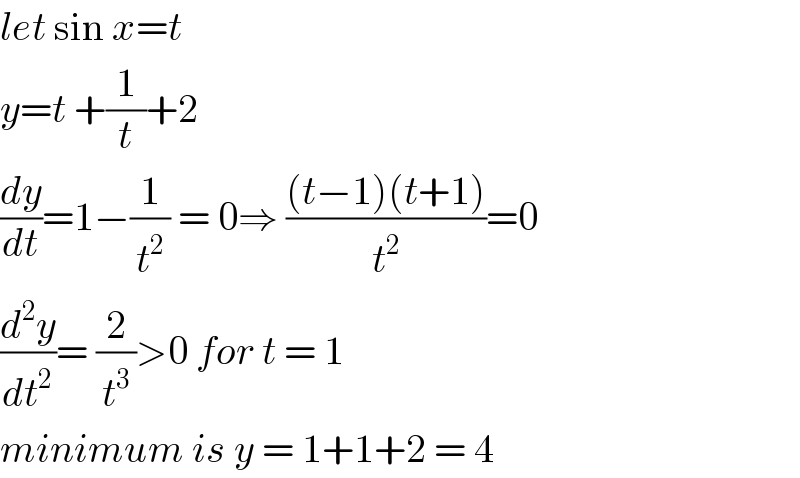Question Number 78395 by john santu last updated on 17/Jan/20

$${what}\:{minimum}\:{value}\:{of}\: \\ $$$${y}\:=\:\mathrm{sin}\:{x}+\mathrm{cosec}\:{x}+\mathrm{2}\: \\ $$
Commented by jagoll last updated on 17/Jan/20

$${let}\:\mathrm{sin}\:{x}={t} \\ $$$${y}={t}\:+\frac{\mathrm{1}}{{t}}+\mathrm{2} \\ $$$$\frac{{dy}}{{dt}}=\mathrm{1}−\frac{\mathrm{1}}{{t}^{\mathrm{2}} }\:=\:\mathrm{0}\Rightarrow\:\frac{\left({t}−\mathrm{1}\right)\left({t}+\mathrm{1}\right)}{{t}^{\mathrm{2}} }=\mathrm{0} \\ $$$$\frac{{d}^{\mathrm{2}} {y}}{{dt}^{\mathrm{2}} }=\:\frac{\mathrm{2}}{{t}^{\mathrm{3}} }>\mathrm{0}\:{for}\:{t}\:=\:\mathrm{1}\: \\ $$$${minimum}\:{is}\:{y}\:=\:\mathrm{1}+\mathrm{1}+\mathrm{2}\:=\:\mathrm{4} \\ $$
Commented by mr W last updated on 17/Jan/20
![no maximum and no minimum sir! example: x→0^+ : y→+∞ x→0^− : y→−∞ in fact: y∈[4,+∞)∧(−∞,0]](https://www.tinkutara.com/question/Q78403.png)
$${no}\:{maximum}\:{and}\:{no}\:{minimum}\:{sir}! \\ $$$${example}: \\ $$$${x}\rightarrow\mathrm{0}^{+} :\:{y}\rightarrow+\infty \\ $$$${x}\rightarrow\mathrm{0}^{−} :\:{y}\rightarrow−\infty \\ $$$${in}\:{fact}:\:{y}\in\left[\mathrm{4},+\infty\right)\wedge\left(−\infty,\mathrm{0}\right] \\ $$
Commented by john santu last updated on 17/Jan/20

$${sir},\:{if}\:{range}\:{of}\:{function}\: \\ $$$$\mathrm{4}\leqslant{y}<\infty\:\wedge\:−\infty<{y}\leqslant\mathrm{0}\:{then}\:{the} \\ $$$${minimum}\:{value}\:{is}\:\mathrm{4}? \\ $$
Commented by john santu last updated on 17/Jan/20

$${minimum}\:{value}\:{at}\:{x}\:=\:\frac{\pi}{\mathrm{2}}\:? \\ $$
Commented by mr W last updated on 17/Jan/20

$${no}!\: \\ $$$${in}\:{this}\:{case}\:{the}\:{function}\:{has}\:{a}\:{local} \\ $$$${minimum}\:\mathrm{4}\:{and}\:{a}\:{local}\:{maximum}\:\mathrm{0}. \\ $$$${what}\:{we}\:{get}\:{from}\:\frac{{dy}}{{dx}}=\mathrm{0}\:{is}\:{at}\:{first}\: \\ $$$${only}\:{a}\:{local}\:{minimum}\:{or}\:{a}\:{local} \\ $$$${maximum}. \\ $$
Commented by john santu last updated on 17/Jan/20

$${oo}\:{ok}\:{sir}.\:{thanks} \\ $$
